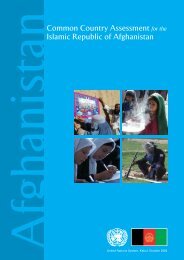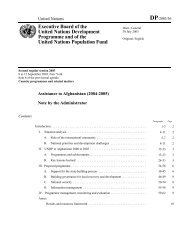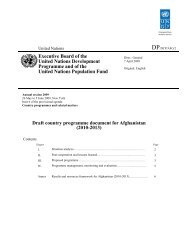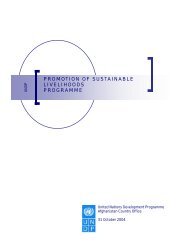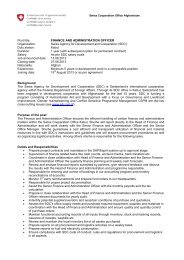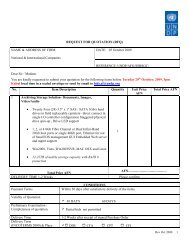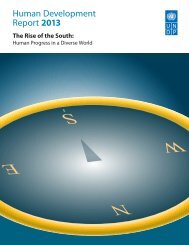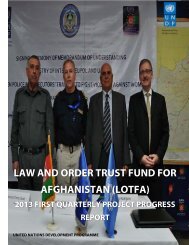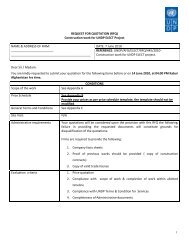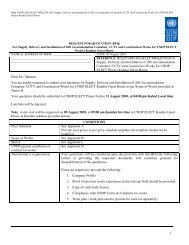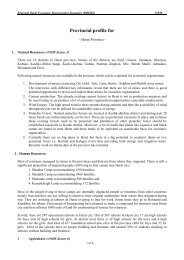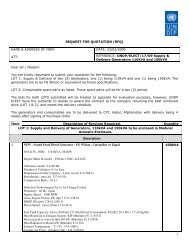GENDER EQUALITY PROJECT - UNDP Afghanistan
GENDER EQUALITY PROJECT - UNDP Afghanistan
GENDER EQUALITY PROJECT - UNDP Afghanistan
You also want an ePaper? Increase the reach of your titles
YUMPU automatically turns print PDFs into web optimized ePapers that Google loves.
sub-national institutions<br />
Community Development Councils) and implementing activities for the socio-economic<br />
empowerment of women.<br />
A number of trainings on basic management skills for PWDC members and officials from the<br />
DoWA and Department of Justice from Herat, Balkh, and Nangarhar were conducted to improve<br />
their service delivery. The training content focused on results-based management techniques and<br />
project/program cycles. However, the training will expand in the future as the PWDCs in Bamyan.<br />
Balkh, Herat, and Nangarhar identified new areas for capacity development which include<br />
entrepreneurship development skills and localization and globalization.<br />
As a result, during the quarterly PWDC meetings held in the four provinces: Bamyan, Balkh, Herat<br />
and Nangarhar, the participants identified new areas for capacity development of the target<br />
groups and prepared a quarterly plan of action for implementation. Some of the new areas<br />
included are as follows:<br />
information relating to localization and globalization, market access and other related issues.<br />
GEP complemented PWDC trainings with a number of other initiatives in order to promote the<br />
socio-economic empowerment of women. One of those initiatives was gender sensitive media<br />
advocacy and public outreach. GEP helped design and implement training for local media<br />
personnel in Balkh and Bamyan. The emphasis on the training was on balanced reporting<br />
of those techniques<br />
across different media channels<br />
In Q2, GEP continued to deepen the collaboration with religious leaders through two new<br />
innovative initiatives. The first was the organization of inter-district-exchange visits for 100<br />
mullahs who have been trained by the<br />
previously organized religious<br />
training programmes from Shindand and<br />
Gulran districts in Herat to Guzara and<br />
Zindajan. Given the influence that mullahs<br />
have over the communities, GEP has<br />
mobilized them to raise awareness of<br />
to be an effective channel. The second<br />
activity was the organization of a joint<br />
program with DoWA and DoHRA involving<br />
twenty-five religious leaders and twentyfive<br />
women activists who shared a common<br />
platform to debate issues relating to gender<br />
equality within the overarching umbrella of<br />
Islamic principles. This was the first time<br />
such a public event was held with<br />
representatives from both sides for the<br />
debate. During this event, both sides were<br />
able to share the view points that marked a<br />
Figure 3: Religious leaders during a working group<br />
session on gender equality issues.<br />
Photo Credit: Shaima Siddiqi<br />
h towards<br />
socio-economic empowerment of women. The key topics discussed included issues relating to:<br />
early marriage, forced marriage<br />
Another initiative is the Legal Help Centres (LHCs) which provide women access to the justice<br />
system when exposed to gender-based violence and raise awareness among women and<br />
in<br />
collaboration with the DoWA ad DoJ in Injil and Kohsan districts. These were opened in response<br />
to a special request by the community who heard about the support being provided by the LHCs<br />
in other districts. There are now 22 LHCs operating in the four provinces.<br />
10 | P a g e



